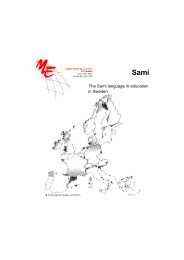Multilingual Early Language Transmission (MELT) - Mercator ...
Multilingual Early Language Transmission (MELT) - Mercator ...
Multilingual Early Language Transmission (MELT) - Mercator ...
You also want an ePaper? Increase the reach of your titles
YUMPU automatically turns print PDFs into web optimized ePapers that Google loves.
‘starting age’, ‘social and geographical settings’, as well as the ‘language competence of the<br />
teacher.” (Edelenbos …et al. 2006: 14)<br />
In 2009, the EU Education Ministers set the target that by 2020 at least 95 % of the children<br />
aged between four and the age in which compulsory primary education starts should<br />
participate in early childhood education. 90 In the Communication report the European<br />
Commission describes the importance of early childhood education and care (2011):<br />
“<strong>Early</strong> Childhood Education and Care (ECEC) is the essential foundation for successful lifelong<br />
learning, social integration, personal development and later employability.” 91<br />
The European Commission defines ‘<strong>Early</strong> language learning’ as follows:<br />
‘<strong>Early</strong> <strong>Language</strong> Learning (ELL) at pre-primary level’ means systematic awareness raising or<br />
exposure to more than one language taking place in an early childhood education and care<br />
setting in a pre-primary school context. 92<br />
In 2011, a group of national experts, convened by the European Commission, debated on<br />
current needs and issues in the field of pre-primary language awareness and acquisition in<br />
Europe. These data and results are presented in a Handbook, including summaries of the<br />
participating countries and the good practices.<br />
However, the central message of research on ‘multilingualism’ and ‘early language learning’<br />
is: "Start early!" There are many advantages when children have the opportunity to acquire<br />
more languages at an early age. Research suggests that bilingualism has positive effects on<br />
children’s linguistic and educational development: they develop more flexibility in their<br />
thinking as a result of processing information through two different languages. There are<br />
long-term cognitive, linguistic, social, economic, and cultural benefits to become<br />
multilingual.<br />
Some benefits 93 to learn more languages from the early start are:<br />
Bi- or multilingual children communicate easier, faster, and better with other people<br />
(in this increasingly globalised world).<br />
Children are less shame (than adults) to use new languages other than their mother<br />
tongue.<br />
Their pronunciation is better in both languages, they do hardly have an accent, or not<br />
at all.<br />
Bilingual children can manage their grammar better; there is also more chance to<br />
develop better writing skills. Compared to adults children who acquire a second<br />
language at early age make fewer spelling errors.<br />
90<br />
Council conclusions of 12 May 2009 on a strategic framework for European cooperation in education<br />
and training (‘ET 2020’) (2009/C 119/02), http://eurlex.europa.eu/LexUriServ/LexUriServ.do?uri=OJ:C:2009:119:0002:0010:EN:PDF<br />
[Accessed June 2011].<br />
91<br />
EUROPEAN COMMISSION, COMMUNICATION FROM THE COMMISSION . (2011) <strong>Early</strong> Childhood Education and Care: Providing all our<br />
children with the best start for the world of tomorrow. Brussels<br />
http://ec.europa.eu/education/school-education/doc/childhoodcom_en.pdf [Accessed June 2011].<br />
92<br />
EUROPEAN COMMISSION ( 2011), COMMISSION STAFF WORKING PAPER European Strategic Framework for Education and training (ET<br />
2020) LANGUAGE LEARNING AT PRE-PRIMARY SCHOOL LEVEL: MAKING IT EFFICIENT AND SUSTAINABLE A POLICY HANDBOOK. Brussels.<br />
http://ec.europa.eu/education/languages/pdf/ellpwp_en.pdf [Accessed June 2011].<br />
93<br />
In <strong>Mercator</strong> newsletter “Conference: <strong>Early</strong> foreign language learning" (May 2011 num. 71) “Conferentie: 'Vvto in opmars' over vroeg<br />
vreemde talen onderwijs 12-05- 2011” (the experts speakers: Hell van J., Bot de K. & Krikhaar E). Leeuwarden: <strong>Mercator</strong> European<br />
Research Centre on <strong>Multilingual</strong>ism and <strong>Language</strong> Learning<br />
51



